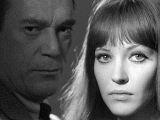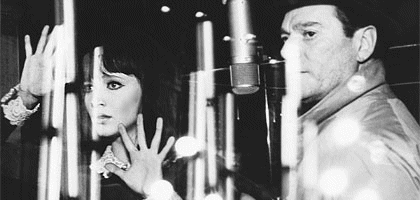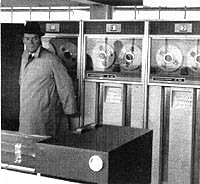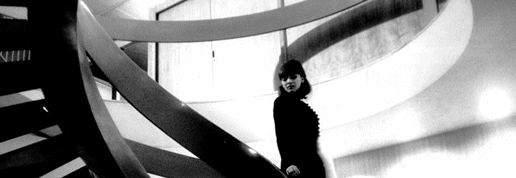Sixties
City presents
a wide-ranging series of
articles on all aspects of the Sixties, penned by the creator of the iconic
60s music paper Mersey
Beat
|
Sixties
City presents
a wide-ranging series of
articles on all aspects of the Sixties, penned by the creator of the iconic
60s music paper Mersey
Beat
|
||||||
|
 |
Driving
his Ford Galaxie, Lemmie Caution leaves the Outer Countries and passes through
Inter-sidereal space to Alphaville, the Capital of Pain. It is seventeen
minutes past midnight, he is alone, a revolver rests in the glove compartment
of his car. Under the assumed identity of Ivor Johnson, reporter for Figaro-Pravda,
Lenny has a mission to kidnap or assassinate Professor Von Braun, architect
of the totalitarian city which is controlled by his creation, Alpha 60,
whose presence pervades this capital of a distant Galaxy. So begins Jean Luc-Godard’s stylish but enigmatic futuristic thriller ‘Alphaville’, filmed without sets on the streets of Paris, creating an unearthly but real landscape. Glass walled buildings, labyrinthine corridors, pools of light in the blackness turn a familiar Paris into a menacing, yet stylish Alphaville, contrasting with the film noir atmosphere of scenes filmed in seedy hotels and dark streets. ‘Alphaville’ contains many visual references to varied sources from pulp fiction and comics, to B movies, serials, cartoons and film classics. |
 |
A
Bible/Dictionary is owned by every inhabitant of Alphaville and new editions
are distributed daily. In it, more and more words become forbidden, words
such as redbreast, autumn light, conscience, tears, tenderness – all cease
to exist. The inhabitants of the Outer Countries: Nueva York, Tokyorama,
Florence, don’t wish this mechanical monstrosity to infest their own Galaxy
and have sent in agents on what amounts to a suicide mission. Caution himself
is uncompromisingly tough and treats violence in an almost casual way, shooting
first and not worrying about the consequences. At one point he knocks down
a heavy and drives a car over his head. Brainwashing has reduced the inhabitants to electronic slaves; robots to do the bidding of the machine whose computer centres are everywhere. The people move about like somnambulists, topped up with tranquilisers which are provided free in every room. They talk ritualistically. If you say ‘Hello,’ they invariably reply, “Very well, thank you, please.” Caution is escorted to his hotel room by a girl devoid of emotion, a Seductress, Third Class, tattooed with a number on her back. She offers herself to him and he rejects her, resulting in a cop bursting into his room demanding to know why he refuses the girl. Lemmy dodges as the cop takes a swing at him and they begin to fight. The cop manages to smash his fist through two glass walls and a mirror, gets himself ducked into a bath with a towel over his head, throws himself through two more glass walls and, as Lemmy grabs his gun from the bedroom, is shot. |
|
“Here at Alphaville their ideal is…a pure technology…an entirely technical
society…like those of ants and termites! In Alphaville there are no artists,
novelists, musicians, painters.” When the 70-year-old Dickson begins to fondle a 20-year-old Seductress and goes into convulsions, he gives Caution a message before he dies: “Lemmy…conscience…conscience…destroy…make Alpha 60…destroy itself…tenderness…save those who weep.” Dickson has left Lemmy a book of poems, Eluard’s ‘The Capital of Pain.’ He sets off to pick up Natasha who is listening to Alpha 60 give a lecture. He takes her away. They are seemingly pursued by the voice of the machine, its lecture continuing. She takes him along to an execution inside a swimming pool. Lines of men are herded by soldiers with machine guns onto a diving board. As each falls in, girls armed with knives dive in and stab the men to death. He’s told that generally 50 men to every woman are executed. “But what have they done?” he asks. “They behaved illogically,” he is told. One man is killed because he wept when his wife died. As the condemned man steps forward he says, “Listen to me, you normals. We see the truth that you no longer see. This truth is, that there is nothing true in man except love and faith, courage and tenderness, generosity and sacrifice: everything else is but the artifice created by the progress of your own blind ignorance.” Lemmy spots Professor Von Braun and tries to speak to him, but is beaten up by his bodyguards. Natasha sees him lying unconscious. A man asks, “You’re not crying, are you?” “No…because it is not allowed,” she answers, but tears fall slowly down her cheeks. Lemmy is taken and interrogated by Alpha 60 . . . . . . |
 |
 |
Alpha
60: “You have come from the Outerlands. What did you feel as you passed
through Galactic space?” Lemmy: “The silence of infinite space…appalled me.” Alpha 60: “What is the privilege of death?” Lemmy: “To die no longer.” Alpha 60: “What transforms the night into day?” Lemmy: “Poetry.” Alpha 60: “What is your religion?” Lemmy: “I believe in the immediate inspiration of my conscience.” As the interrogation continues, Alpha 60 cannot understand him. “You’re hiding certain things, although I don’t yet know what they are,” he says, so for the time being he will allow Lemmy to go free. |
| After
various adventures Lemmy kills the Professor and destroys Alpha 60 by reading
it the poetry of Eluard. As Alphaville begins to break down he drives out
of the city with Natasha. “Don’t turn around,” he tells her as they enter
Inter-sidereal space. It’s a scene immediately similar to that of Lot and
his wife fleeing from Sodom or Orpheus fleeing from the Underworld with
Eurydice. Many years later, the closing scene in ‘Blade Runner’ echoed it. He looks at her strangely and she knows he expects her to say something in particular. She asks what it is. “I don’t know what to say. At least I don’t know the words, I was never taught them. Please help me,” she pleads. Lemmy answers, “Impossible, Princess. You’ve got to manage by yourself and only then will you be saved. If you can’t then you are as lost as the dead in Alphaville.” She says, “I…Love…you…I love you.” Jean Luc Godard wrote the script, which he’d originally called ‘Tarzan Versus IBM,’ and initially called Professor Von Braun, Professor Leonardo Da Vinci and Lemmy’s other name was Jack Smith, not Ivor Johnson. |
 |
|
Article
|